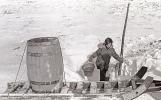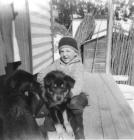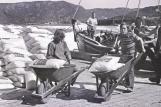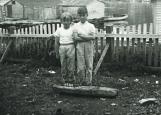1
In a traditional Newfoundland small town or outport, specially during the days of the salt cod industry, there was a lot of work to do to keep a large family going. With no running water, no quick way to get to to a service centre to buy what you needed, children were very much involved in helping keep house, tending kitchen gardens, feeding work animals, getting water and wood, and helping with the fishery. As usual with children, if they could get out of their chores by conveniently disappearing they did so. That being said, most children understood the seriousness of the role they played in sustaining their families and so did their part to keep things running. They also knew that sherking responsiblilites could bring a swift spanking or sharp tongue from a parent. With that in mind, the chores usually got done one way or another. Stories and comments about "chores" take up as big a part of describing childhood in rural Newfoundland as does playtime and unforgetable adventures.3
I'd say the hardest thing was all the work we had to do. Because when we go out of school in the evening, if it was fishing time, you had to go take the fish up off the flake. If it was Saturday morning, that was the first thing we had to do, to go out on the flake and spread the fish out. And then they'd take you out in boat Saturday, perhaps it'd be eight or nine o'clock. They bring you out to Sou'west Croque and heave you out to pick berries. Perhaps you would be out till five or six o'clock in the evening before they came back for you. We used to pick flour sacks full of them. And you would have five or six flour sacks by the time they came back for you.Josephine Flynn Clark - Croque
5
We had to go to the well to bring in water because we didn't have running water until I was about 15. We would bring in water and fill up the barrel during the day for my mother to use for washing and so on. Wiintertime that well would close in because we were dipping water and spilling water on the edge. Sometimes it would close in, freeze, to about a foot and a half diamter. You would have to reach down there and it was slippery. If you went head first down there, you wouldn't be able to get out. There wasn't even enough room to turn around down there.Con Coates - Main Brook
6
A young boy unloads cod fish at the fishplant wharf.Circa 1968 - 1970
Englee, Newfoundland
 Credits:
Credits:Candace Cochrane
7
I'd say I was about 11 or 12 years old when I got to be big enough to go out fishing in boat. Get up before daylight and you'd be at it then till dark. I liked it for a time but then you never had the freedom you might like to have. You had no other choice. My friends were pretty much the same. Some crews had big families fishing. With us, it was only me and my father.Len Clark - Grandois-St. Julien's
9
I went to a 2-room school that had about 50 to 60 kids in it. Everybody had to bring wood because there was a pot-bellied stove in the corner for heat. That was everybody's chore. Every day you had to bring a junk of wood.Tony Kearney - Croque
11
We used to have to feed the dogs. They used to be in pens at the side of the stage. Like a big old place with no roof on it. When the men used to come in with the fish, we used to get the fish heads and throw them into the pens over to the dogs. I can remember in wintertime when they used to mix up the flour, big boilers of flour. They used to boil it on a fire outdoors and then all the dogs would be into that, eating it.Josephine Flynn Clark - Croque
Dog teams were used everyday in the wintertime. I used to go in with my father and cut firewood before the snow came. You would pile it all up. Then when the snow came, you got the dogs and haul it out. It was a big job to get good stuff to feed the dogs. We kept herring and stuff like that, and seal meat. When we were kids, it was fun. We weren't really old enough to understand the work involved. All we knew was mostly getting a good ride.
Len Clark - Grandois
13
In the fall of the year, when the schooners came in to buy the fish, we would go up and help load fish aboard the boats. I think we got 25 cents an hour. We used to load fish or unload salt.Len Clark - Grandois-St. Juliens





